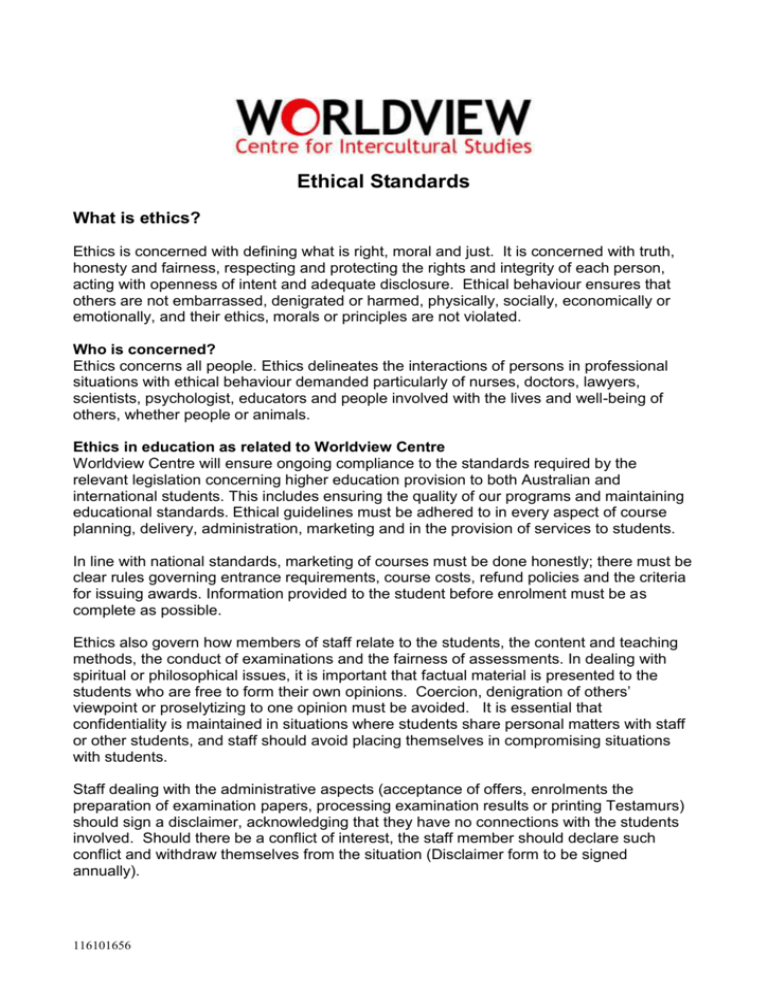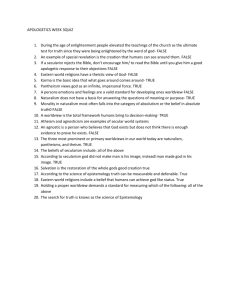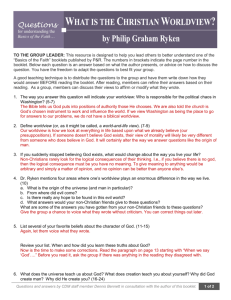Ethical Standards - Worldview Centre for Intercultural Studies
advertisement

Ethical Standards What is ethics? Ethics is concerned with defining what is right, moral and just. It is concerned with truth, honesty and fairness, respecting and protecting the rights and integrity of each person, acting with openness of intent and adequate disclosure. Ethical behaviour ensures that others are not embarrassed, denigrated or harmed, physically, socially, economically or emotionally, and their ethics, morals or principles are not violated. Who is concerned? Ethics concerns all people. Ethics delineates the interactions of persons in professional situations with ethical behaviour demanded particularly of nurses, doctors, lawyers, scientists, psychologist, educators and people involved with the lives and well-being of others, whether people or animals. Ethics in education as related to Worldview Centre Worldview Centre will ensure ongoing compliance to the standards required by the relevant legislation concerning higher education provision to both Australian and international students. This includes ensuring the quality of our programs and maintaining educational standards. Ethical guidelines must be adhered to in every aspect of course planning, delivery, administration, marketing and in the provision of services to students. In line with national standards, marketing of courses must be done honestly; there must be clear rules governing entrance requirements, course costs, refund policies and the criteria for issuing awards. Information provided to the student before enrolment must be as complete as possible. Ethics also govern how members of staff relate to the students, the content and teaching methods, the conduct of examinations and the fairness of assessments. In dealing with spiritual or philosophical issues, it is important that factual material is presented to the students who are free to form their own opinions. Coercion, denigration of others’ viewpoint or proselytizing to one opinion must be avoided. It is essential that confidentiality is maintained in situations where students share personal matters with staff or other students, and staff should avoid placing themselves in compromising situations with students. Staff dealing with the administrative aspects (acceptance of offers, enrolments the preparation of examination papers, processing examination results or printing Testamurs) should sign a disclaimer, acknowledging that they have no connections with the students involved. Should there be a conflict of interest, the staff member should declare such conflict and withdraw themselves from the situation (Disclaimer form to be signed annually). 116101656 Special consideration Due to the integrated nature of Worldview courses, a distinction needs to be made between the academic component of a course and other professional elements, such as personal development or suitability for a particular work or activity. Ethical conduct for students Ethical conduct for students includes the need to be aware that plagiarism, copying or other forms of cheating are ethically unacceptable (see Worldview Plagiarism Policy). There must be no fraudulent misrepresentation of their abilities or educational competence and any work submitted must be written by the person it is purported to be. There is an assumption that the student has mastered the necessary skills of written communication to a level adequate to complete the course. It is assumed that the student has mastered the common skills and abilities of written communication that are presumed to be of an adequate level, namely the ability to spell correctly, to write a grammatically correct and effective sentence and to construct a unified and coherent paragraph. When interacting with others – in group work, field work, work experience or projects – basic ethical principles apply. The code of conduct below outlines the standard of ethical behaviour expected of students enrolled at Worldview Centre. Code of conduct for student contact with the public as part of studies As a student enrolled at Worldview Centre for Intercultural Studies you will have contact with members of the public in a number of contexts as a component of your course. Ensure that you are familiar with and adhere to the code of conduct that guides your behaviour in those circumstances. Ethics guards the privacy of individuals and ensures that subjects are willing participants, cognisant of the procedures and how resultant data will be utilised and that they are not subjected to procedures which could lead to physical, psychological or moral harm. Questions about religion or religious practice can be regarded as sensitive information. When gathering information for assessment purposes ensure that participants are aware of the procedure you will follow ensures that participants are aware of how their responses will be used personal information (name/ address/ telephone number) must not be collected (Tasmanian Personal Information Protection Act, Commonwealth Privacy Act) information must not be identifiable (no names are necessary as part of your assessment) participation is voluntary participation without coercion is ensured inform participants that they can withdraw at any time confidentiality is ensured treat all members of the public with respect, dignity, impartiality, courtesy and sensitivity. 116101656 The following modules have assessment tasks that involve contact with the public in a specified manner. BTB/D1-1 Discipleship: Interview church pastor, church person, student and staff about personal goals. BTB2-10 Bible in Cross-cultural perspective: Befriend a non-believer. Journal their cultural journey. BTB3-13 Spiritual Guidelines for Church planters: Team exercise: put together a team of five ministry leaders to discuss insights into their practice of spiritual disciplines etc MCB/D1-2 Cultural Anthropology: Interview person of other ethnic group with ethnographic questions MCB/D1-4 World Religions: Meet at least three times with a person who regularly practices another religion. Write a reflective journal. MCB/D2-10 Spirituality and religion: Interview with someone who practices a non religious spirituality to find out about their journey. Discuss in class. MCB2-13 Urbanisation and the Gospel: Interview someone working with the urban poor and 2 unemployed using questions designed to address the module outcomes. MCB3-16 In-depth investigation: Collect statistics and information Personal conduct All students must: treat all members of staff, visiting lecturers, consultants, contractors, volunteers, any other members of the public and other students with respect, dignity, impartiality, courtesy and sensitivity maintain a cooperative and collaborative approach to inter-personal relationships act honestly and ethically in their dealings with Worldview staff, visiting lecturers, consultants, contractors, volunteers, any other members of the public and other students respect the privacy of Worldview staff, visiting lecturers, consultants, contractors, volunteers, any other members of the public and other students ensure that they do not act in a manner that unnecessarily or unreasonably impedes the ability of employees, honorary appointees, consultants, contractors, volunteers, any other members of the public and other students to carry out their study, research activities or work at the Centre, including in the Worldview Library, classrooms and auditorium ensure that they do not become involved in or encourage discrimination against or harassment or bullying of Worldview staff, visiting lecturers, consultants, contractors, volunteers, any other members of the public or other students. Academic conduct All students must: ensure that their enrolment and progress in their award course is lawful and consistent with Worldview policies maintain current information and observe key dates and deadlines read all official Worldview correspondence, including email act ethically and honestly in the preparation, conduct, submission and publication of academic work, and during all forms of assessment, including formal examinations and informal tests avoid any activity or behaviour that would unfairly advantage or disadvantage another student academically 116101656 behave professionally, ethically and respectfully in all dealings with the Centre's learning partners during ministry placements including missions and practicum, and use Worldview resources, including information and communication technology resources, in a lawful and ethical manner and for Worldview purposes only, unless express permission has been granted for non-Worldview or private usage. 116101656







